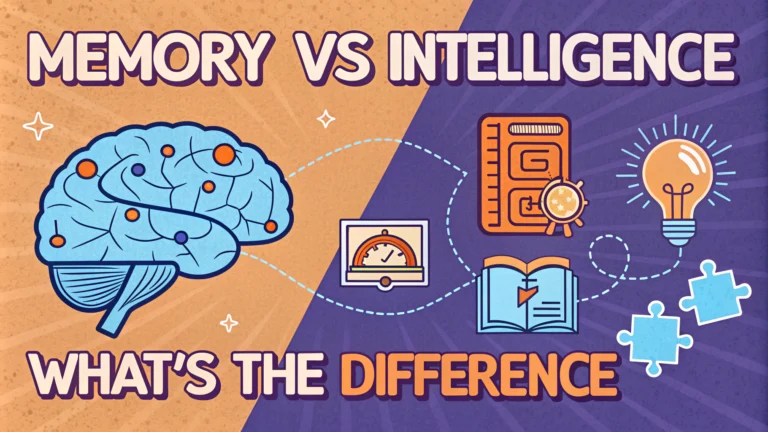The difference between memory and intelligence shapes how we learn, solve problems, and navigate daily life. While these cognitive functions are interconnected, they serve distinct purposes in our mental processes.
Memory focuses on storing and retrieving information, while intelligence involves processing, analyzing, and applying knowledge to solve new problems. Understanding these differences helps optimize learning strategies and cognitive development.
Key Components of Memory
- Short-term memory (working memory) – Holds information temporarily
- Long-term memory – Stores information for extended periods
- Procedural memory – Handles learned skills and routines
- Declarative memory – Manages facts and experiences
Types of Intelligence
- Fluid intelligence – Problem-solving ability with new information
- Crystallized intelligence – Application of learned knowledge
- Spatial intelligence – Visual and spatial problem-solving
- Emotional intelligence – Understanding and managing emotions
How Memory and Intelligence Work Together
Memory supplies the raw data that intelligence processes to form solutions and insights. This partnership enables both quick responses to familiar situations and creative solutions to new challenges.
| Memory Function | Intelligence Application |
|---|---|
| Storing facts | Analyzing patterns |
| Recalling experiences | Problem-solving |
| Learning procedures | Adapting strategies |
“Memory is the treasury and guardian of all things.” – Cicero
Boosting Memory and Intelligence Through Daily Habits
Your brain works best when supported by specific lifestyle choices and mental exercises. The right combination of habits can enhance both memory storage and processing abilities.
Reliable Methods to Build Memory Skills
Practice makes permanent when it comes to memory improvement. Proven techniques help create stronger neural connections.
- Active recall – Test yourself instead of re-reading
- Spaced repetition – Review information at increasing intervals
- Mind mapping – Create visual connections between concepts
- Memory palace – Link information to physical locations
Intelligence-Building Activities
| Activity | Benefit |
|---|---|
| Logic puzzles | Improves pattern recognition |
| Learning languages | Enhances cognitive flexibility |
| Musical training | Boosts spatial reasoning |
Physical Habits That Support Brain Function
- Sleep – 7-9 hours for memory consolidation
- Exercise – 30 minutes daily for improved blood flow
- Nutrition – Omega-3s, antioxidants, and B vitamins
- Hydration – 8 glasses of water daily minimum
Brain-Training Tools and Resources
Select tools that target specific cognitive skills you want to improve.
- Apps – Lumosity, Peak, Elevate
- Games – Chess, Sudoku, crosswords
- Software – Anki for spaced repetition
“The brain is like a muscle. When it is in use we feel good.” – Carl Sagan
Moving Forward with Enhanced Mental Skills
Track your progress using memory tests and problem-solving challenges. Regular assessment helps identify areas for improvement and maintains motivation.
Remember that consistent practice leads to lasting improvements in both memory and intelligence.
FAQs About Memory vs Intelligence
Q: What is the main difference between memory and intelligence?
Memory is the ability to store and recall information, while intelligence is the ability to learn, understand, problem-solve, and apply knowledge in new situations.
Q: Can someone have a good memory but average intelligence?
Yes. Memory and intelligence are distinct cognitive abilities. Someone can have excellent memorization skills while showing average performance in problem-solving tasks.
Q: Does working memory affect IQ scores?
Working memory has a significant correlation with IQ scores, typically accounting for 20-30% of the variance in intelligence test results.
Q: Which is more important for academic success: memory or intelligence?
Both are crucial, but studies show that intelligence is generally a stronger predictor of academic achievement than memory alone.
Q: Can memory capacity be improved?
Yes, through techniques like:
- Mnemonic devices
- Spaced repetition
- Active recall practice
- Memory training exercises
Q: What are the different types of memory?
Main memory types include:
- Short-term memory
- Long-term memory
- Working memory
- Sensory memory
Q: Does high IQ mean better memory?
Not necessarily. While there’s some correlation between IQ and memory performance, they are separate cognitive functions.
Q: What role does memory play in fluid intelligence?
Fluid intelligence relies on working memory capacity but is more focused on reasoning and problem-solving with novel information.
Q: Can intelligence be improved like memory can?
While core intelligence is relatively stable, specific cognitive skills can be enhanced through:
- Educational experiences
- Problem-solving practice
- Critical thinking exercises
- Novel learning challenges
Q: How do memory disorders affect intelligence?
Memory disorders like amnesia typically don’t affect overall intelligence, though they can impact the ability to learn new information and apply knowledge.
Q: What’s the relationship between short-term memory and IQ?
Short-term memory capacity shows moderate correlation with IQ scores, particularly in tasks requiring information processing and manipulation.
| Memory Characteristics | Intelligence Characteristics |
|---|---|
| Information storage and retrieval | Problem-solving ability |
| Can be trained directly | More stable over time |
| Measured by recall tests | Measured by reasoning tests |



















